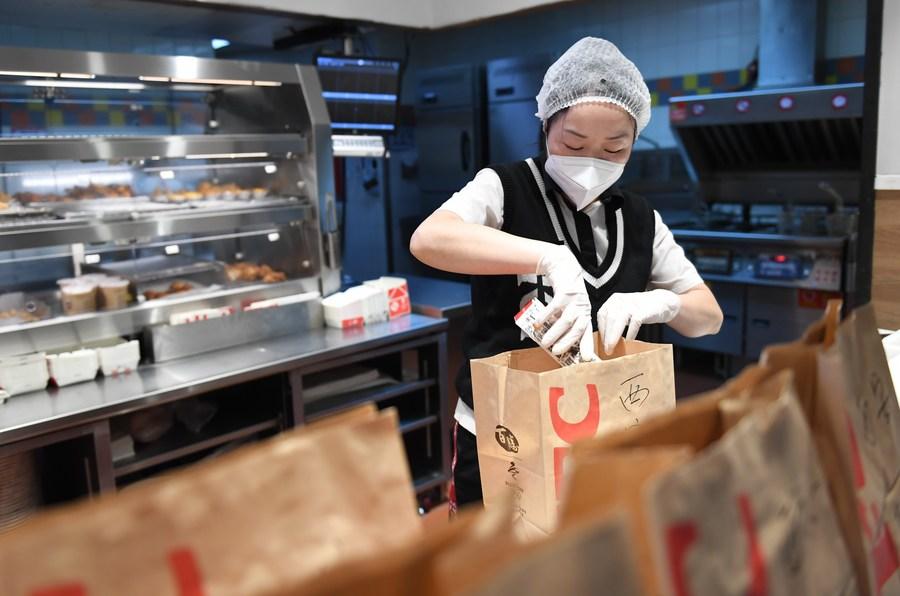Socioeconomic growth goals high on meetings' agenda
 0 Comment(s)
0 Comment(s) Print
Print E-mail China Daily, February 27, 2023
E-mail China Daily, February 27, 2023

A staff member packs takeouts at a restaurant in Xi'an, capital of Northwest China's Shaanxi province, Jan 13, 2022. [Photo/Xinhua]
The spotlight will be on Beijing as the two sessions, China's biggest annual political event and a window to observe the country's development, get underway on Saturday.
The two sessions are the meetings of the National People's Congress, the nation's top legislature, and the National Committee of the Chinese People's Political Consultative Conference, the country's top political advisory body.
While looking back at achievements made in the past years, policymakers will use the two sessions to set development goals for the year ahead and unveil new policy priorities.
Against the backdrop of the lingering effects of COVID-19, all eyes are on China and how it formulates its 2023 socioeconomic development goals after announcing on Feb 16 that it had secured a "major, decisive victory" in fighting the virus.
Observers are also watching how policymakers respond to people's concerns over issues such as employment, education, housing and healthcare, as well as how the legislation and policies unveiled at the two sessions boost market confidence both at home and abroad.
Gao Ruidong, chief macroeconomist at Everbright Securities, said the key phrases for this year's two sessions will be "stabilizing growth" and "boosting high-quality development". The focus will also be on what measures are unveiled to stimulate consumption and expand investment, particularly in the infrastructure, manufacturing and real estate sectors, he said.
In the past three years, China's average economic growth maintained a hard-won 4.5 percent year-on-year, Gao said, adding that the growth rate is expected to be higher this year given the good momentum and the rapid recovery of both consumption and investment.
The strong resilience of the Chinese economy can be seen in official statistics. In January, the country's manufacturing sector started to expand again after shrinking for three consecutive months, with the purchasing managers' index reaching 50.1, up from 47 in December, according to data from the National Bureau of Statistics.
As China has optimized its epidemic prevention and control measures, the flow of people, goods and information has brought much vitality to the country.
The rebound of the Chinese economy has not just attracted global attention, but has also sparked interest among international investors. Foreign direct investment in the Chinese mainland, in actual use, expanded 14.5 percent year-on-year to 127.69 billion yuan ($18.4 billion) in January, according to the Ministry of Commerce.
After international investment banks and financial institutions, including Morgan Stanley, Goldman Sachs, HSBC, Barclays and Natixis, upwardly revised their 2023 forecasts for China, the International Monetary Fund also lifted its forecast of China's economic growth rate for this year. "Growth in China is projected to rise to 5.2 percent in 2023, reflecting improving mobility," the IMF said in an update to its World Economic Outlook report. The updated number was 0.8 percentage points higher than the October 2022 forecast.
Seen as an embodiment of Chinese democracy, the NPC session will bring together some 3,000 lawmakers from across the country to discuss major laws, and approve several key documents, including the Government Work Report and the national budget.
More than 2,000 political advisers will participate in discussions of the documents and put forward their opinions and suggestions at the session of the CPPCC National Committee.
While shaping the political and economic agendas for the year ahead, the two sessions are also likely to announce plans for military, diplomatic, trade, environmental and other policies.
The sessions are very significant this year as 2023 marks the start of the country's new journey to realize Chinese-style modernization — a goal that the 20th National Congress of the Communist Party of China in October set in order to build China into a modern socialist country in all respects by the middle of this century.
As this year marks the 45th anniversary of China's reform and opening-up, the two sessions might send messages to the world on the fresh moves to further deepen reform and opening-up, while emphasizing coordination of both development and security, analysts said.
The tone-setting Central Economic Work Conference in December made it clear that China will promote a new round of all-around reforms and adhere to high-level opening-up. A proposal for the reform of Party and State institutions was discussed at the meeting of the Political Bureau of the CPC Central Committee on Feb 21.
Yang Changyong, a researcher at the Beijing-based Academy of Macroeconomic Research, said that amid the complex international environment, it is necessary to pay attention to the traditional security issues in opening-up, such as trade frictions and export restrictions.
In the meantime, Yang said, the nation should attach greater importance to the new security problems arising from the changes of the international landscape in recent years, including food security, energy and resources security, and industrial and supply security.
While watching China's policy support for economic recovery, observers said that global attention will also be focused in the direction of China's post-COVID foreign policy amid the challenges of geopolitical competitions and the influences of the ongoing Russia-Ukraine conflict, particularly how it handles relations with the United States.






Go to Forum >>0 Comment(s)